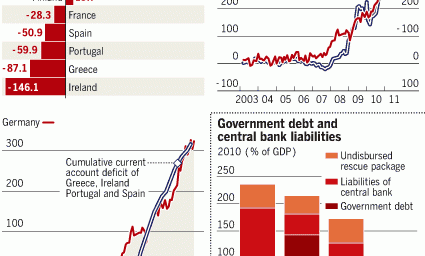Oskar Lafontaine, German Finance Minister Who Started Euro, Calls For Euro’s End
Oskar Lafontaine has changed his mind.
AP (“Oskar Lafontaine, the German who helped start euro now calls for its end“):
The leftwing opposition politician who was Germany’s finance minister when the euro was adopted says it’s time to think about abandoning the common currency in the wake of the enormous economic problems in southern Europe.
Oskar Lafontaine says on his website that struggling eurozone countries have not been able to devalue their currencies to help them cope with the economic crisis that has seen several slip into recession.
Lafontaine proposes a restructuring of Europe’s banking system, stricter controls on lenders, and a return to the European monetary system that preceded the euro.
Lafontaine is now out of federal politics but is still an influential member of the Left Party, the successor to former East German communists.
He’s a wee bit late to the game; these structural problems were obvious from the outset and the practical implications resulting from the Great Recession have been apparent for several years. The Euro isn’t going anywhere; turning back is just too costly. The only question is whether the eurozone will shrink to remove the weakest economies.






The eurozone lacks the kind of wealth distribution that US states have.
At root the problems of the eurozone are a German political problem. There are really only a handful of workable solutions to the euro’s problems. The simplest would be for Germany to leave the euro.
The second would be to abolish the euro. Remove the weakest economies? By that I presume you mean Portugal, Ireland, Italy, Greece, and Spain. France wouldn’t be far behind. The end game of that would be abolishing the euro.
The third alternative is political union. Germans would pay for Greeks the same way that New Yorkers pay for Mississippians and for the same reasons.
The Euro was always doomed – you can’t have a common fiat currency without common political and economic institutions.
@PJ:
No, there was a kind of wealth distribution, it was called structural funds and it was part of the problem. Most of the countries that received these funds had a pretty poor manufacturing sector and low productivity in the economy, and they simply invested in things like infrastructure and in the government sector. Portugal has better railways than New York, Spain has it´s own high speed rail(Real high speed rail). These countries did imagine that they could reach prosperity by simply being part of the EU, not by improving manufacturing and the productivity of the economy.
(Ireland is basically a giant tax haven, and companies like Google are facing a Public Relations disaster, because they use their subsidiaries in Ireland to avoid paying taxes in the United Kingdom and France).
Most of these countries failed to substantially improve their industry and their agriculture, and the Euro worsened the situation because it increased the cost of living and salaries, to the point that these countries lost industries to Turkey, Eastern Europe and to the Magreb.
The difference between the United States and Europe is that the United States is divided between states, not countries(Anyway, most continental countries faced territorial wars between their political divisions). If you are unemployed in Alabama you can get a job in Nevada, and viceversa. For a Spaniard is much more complicated to get a job in Germany, because it´s another language and another culture. In fact, there are different retirement ages, with huge discrepancies.
The effect of the Euro in Greece was a sharp increase in the cost of goods combined with a sudden flood of easy money through various programs that were poorly overseen by the folks in Brussels. If people did not hop on the new economy they got left behind. Then everybody realized they were all implicated in the fraud.
An abject lesson in how not to do things.
Of course the Euro was not doomed from the start. Tha adoption of the Euro could have led to tighter economic cooperation and eventually a truly pan-EU financial policy. Though the political reality was different, this is exactly what the most europhile people were hoping for, even though they were not even in the majority of the pro-Euro crowd.
Anyway, saying that the Euro is doomed even now is premature. There is still quite a bit of support (even if sometimes unwilling) for the Euro at the highest political levels. Southern Europe is not doomed to shrink forever, if they become sufficiently poor they become competitive again when exporting which could then be the begin of a recovery, even from a very low level. This is still pretty horrible, and I hope the politicians can avoid this fate, but calling the Euro doomed is premature (and in the US often comes from those who are not unhappy to see the Euro fail).
Better late than never, I guess.
The political union required to make a single currency work hasn’t happened, and seems highly unlikely to happen. Europeans have gotten a lot better at playing nicely with one another (thank goodness), but a European Federation is a long ways off, if it happens at all.
@Tran:
I doubt. Southern Europe was never really competitive and the Euro by itself worsens the situation.